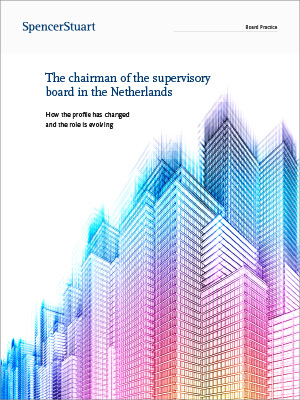
Shares, shareholders, and the monitoring of management have a long history in the Netherlands. By issuing the world’s first tradable shares in 1602, the Dutch Verenigde Oostindische Compagnie introduced a new system to finance large companies. This innovative system had some clear benefits from the start, but also suffered a variety of problems between the parties involved. The pressure to solve these issues eventually resulted in the establishment of supervisory boards to represent shareholders and other stakeholders to look after the interests of the company.
For a long time, these supervisory boards were quite large and recruited members from a limited pool of people. Candidates for supervisory board positions, often known to each other and approached informally, formed the so-called old boys network. Over time, the system gradually changed. Since the 1980s, the financial system has grown rapidly and the position of the shareholder has strengthened. During the following two decades, the globalisation of the economy, in particular financial markets, proceeded at a rapid pace.
The increase in international shareholders, the arrival of large institutional investors, and the growing activities of private equity, altered the environment for companies and their supervisory boards. At the same time, corporate scandals and subsequent public scrutiny created pressure for more regulation. The Sarbanes-Oxley Act (2002) created a new and more demanding regulatory framework for companies active in the US. In the Netherlands, the accounting scandal at Ahold led indirectly to the acceptance of the Tabaksblat Code (corporate governance code), and growing pressure on and higher expectations of supervisory boards. The 2008 financial crisis resulted in increased regulation, affecting the environment in which companies, especially in the financial sector, operated.
This is the backdrop for our study on the changing profile and characteristics of the supervisory board chairmen in listed Dutch companies since 1990. The chairman’s role has changed from being primus inter pares to an important and central position in the Dutch corporate governance system, which has benefited from growing professionalisation.
In the first half of our report we analyse trends in chairman profiles as they relate to age, recruitment and retirement, tenure, executive background, nationality, educational background, and gender.
In the second half of our report we consider how the role of the chairmen will continue to develop over the coming years. As the role evolves so will the selection criteria, which in turn will improve the suitability of potential candidates, improving the quality of the entire corporate governance system.